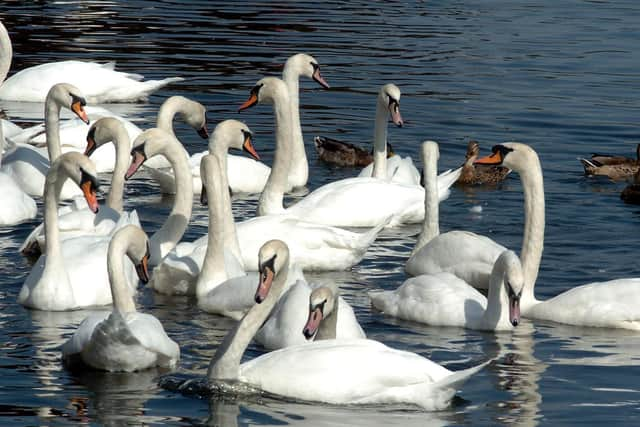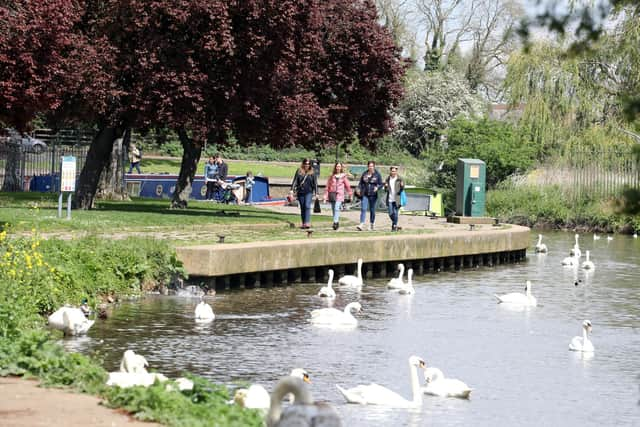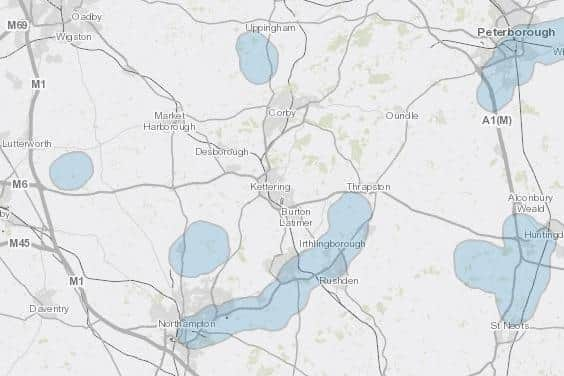Wellingborough swans' deaths confirmed as deadly avian bird flu
and live on Freeview channel 276
Avian Flu has been discovered in three wild birds in North and West Northamptonshire, according to government figures issued today.
Last month four dead swans - one headless - were discovered in the River Nene at the Embankment in Wellingborough and their deaths were being investigated by Northants Police.
Advertisement
Hide AdAdvertisement
Hide AdThe Mute swans' bodies were discovered close to the Whitworth's Mill section of the river and were been reported to the authorities after they were found in the river on Tuesday, November 2. Their bodies were eventually retrieved.


Up until now there has been no official confirmation of any cases in the weekly findings of avian influenza (bird flu) in wild birds locally, but now new figures from the Department for Environment, Food and Rural Affairs (Defra) have confirmed the highly pathogenic disease as the cause of death of the Wellingborough swans.
A total of three Mute swans have been found with bird flu - the two in Wellingborough and one in an unknown location in West Northamptonshire.
In the same week, 58 other wild birds across the UK were also found to be carrying the disease.
Advertisement
Hide AdAdvertisement
Hide AdIt has been mostly water birds - geese, swans and ducks - that have fallen victim but buzzard, kestrel, pheasant, gulls and a sea eagle have also been infected.


In late November, bird owners were warned by North Northamptonshire Council to keep their poultry or other captive birds housed from Monday, November 29 to minimise the risk of avian flu.
The legal requirement, which had come from Defra, had been brought in following a steep rise in cases of bird flu across the UK in recent weeks.
Wild bird populations have seen a huge growth in the UK with latest figures issued by showing 62 cases in one week in swans, geese, pheasant, buzzard, grebe, peregrine falcon, and ducks.
Advertisement
Hide AdAdvertisement
Hide AdUp until now the nearest reported cases of wild bird flu to Northamptonshire were in Stratford-on-Avon and Kings Lynn and West Norfolk.


The River Nene Valley from Denford to Northampton, Pitsford Reservoir and Stoke Dry Reservoir north of Corby have been designated higher risk areas by the Animal & Plant Health Agency.
Responding to a claim on social media that wild swimmers have been told to avoid swimming in the Nene, a UK Health Security Agency spokesman said: "Avian influenza is primarily a disease of birds and the risk to the general public’s health is very low."
From November 29 bird keepers must house birds in accordance with the rules:
Advertisement
Hide AdAdvertisement
Hide Ad• cleanse and disinfect clothing, footwear, equipment and vehicles before and after contact with poultry and captive birds – if practical, use disposable protective clothing
• reduce the movement of people, vehicles or equipment to and from areas where poultry and captive birds are kept, to minimise contamination from manure, slurry and other products, and use effective vermin control
• thoroughly cleanse and disinfect housing on a continuous basis
• keep fresh disinfectant at the right concentration at all farm and poultry housing entry and exit points
Advertisement
Hide AdAdvertisement
Hide Ad• minimise direct and indirect contact between poultry and captive birds and wild birds, including making sure all feed and water is not accessible to wild birds
All keepers of poultry and other captive birds, including pet birds must now comply with the minimum biosecurity measures. 500 or more poultry or other captive birds must also comply with enhanced biosecurity measures. Keepers of poultry and other captive birds must comply with the housing measures.
Birds can be infected with the avian influenza virus through contact with infected saliva, nasal secretions or faeces.
Wild birds including waterfowl are often more resistant to avian influenza than domestic birds, and can carry and transmit the virus without showing evidence of disease.
Advertisement
Hide AdAdvertisement
Hide AdIf you find dead wild waterfowl (swans, geese or ducks) or other dead wild birds, such as gulls or birds of prey, you should report them to the Defra helpline: 03459 33 55 77. Do not touch or pick up any dead or visibly sick birds that you find.